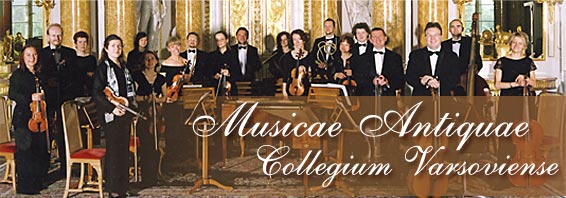Musicae Antiquae Collegium Varsoviense, a full time orchestra on original period instruments, was founded by Stefan Sutkowski in 1957. It was the first early music vocal-instrumental ensemble in Poland. From the beginning, its members set themselves the goal of popularising newly discovered relics of Polish music. These musicians became founder members of Warsaw Chamber Opera, which was founded in 1961 by Stefan Sutkowski, who has served as its Managing and Artistic Director ever since. At present, the Warsaw Chamber Opera company consists of 2 directors, 2 designers, 7 conductors, over 75 soloists, and 3 full-time orchestras (period-instruments ensemble (orchestra) Musicae Antiquae Collegium Varsoviense and two small-size symphony orchestras - the Warsaw Sinfonietta and the Orchestra of Warsaw Chamber Opera ). It also has a the 40-strong Chamber Choir and the Choir specializing in Old Orthodox Music and a Mime Group.
While the opera company expanded, its repertoire enriched by works from the Classical era and later, whilst the Collegium cultivated and perfected the practice of performing early music. Yet music from several centuries ago cannot be given its proper tonal shape without the appropriate instruments, a complete set of which has been acquired thanks to the enduring efforts of the Warsaw Chamber Opera.
Musicae Antiquae Collegium Varsoviense comprises three generations of musicians. Since 1991, the ensemble has used exclusively period instruments, and since 1993 it has worked under the direction of the eminent harpsichordist Wladyslaw Klosiewich, a professor at the Academy of Music in Warsaw. Two other conductors regularly working with the orchestra are Tadeusz Karolak and Kai Bumann.
The existence of such an ensemble made it possible to organise the annual Festival of Baroque Opera in Warsaw, inaugurated in 1993. The ensemble’s musicians hone their skills under leading European specialists, and also take part in numerous international concert and recording projects. Playing alongside the most accomplished ensembles specialising in the performance of early music gives the young musicians who today comprise the Collegium the opportunity for direct contacts with the latest developments in this field of performance. Many musicians and experts in the Baroque and Classical era have also collaborated with the ensemble, including Marie Leonhardt, Nella Anfuso, Richard Wistreich, Frederic Martin, Wieland Kuijken and Jean-Claude Malgoire.
The ensemble’s repertoire includes the first ever opera, Euridice, by Jacopo Peri (1600), all the extant operas by Claudio Monteverdi (L'Órfeo, Líncoronazione di Poppea, Ritorno dÚlisse in patria), the English Operas Venus and Adonis,, by John Blow, and Dido and Auneas, by Jean-Baptiste Lully, the late baroque operas Tetide in Sciro, by Domenico Scarlatti, Zenobia, by J.A.Hasse, and Imeneo and Rinaldo by G.F.Handel, as well as numerous works of oratorical and instrumental music.
Since 2003 the ensemble started working on the project of performance and recording all Mozart works for solo keyboard and orchestra, which comprises all concertos (including double and triple), rondos and early concert arrangements. Musicae Antiquae Collegium Varsoviense has undertaken a considerable number of foreign tous and participated in prestigious international festivals, invariably with warm reception from critics and audience alike.
